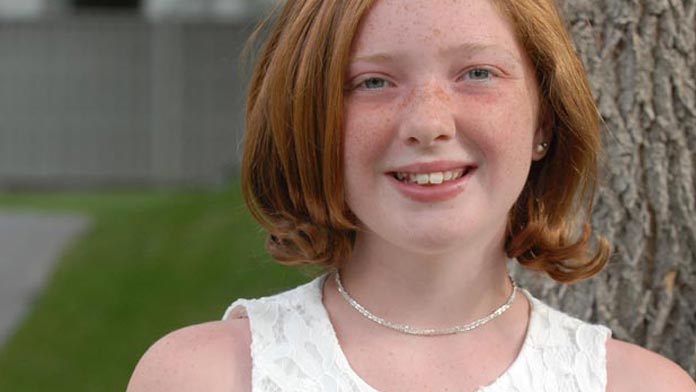
There may come a day when your daughter asks to change the color of her hair. Be forewarned that this might inspire feelings of shock and sadness in the very core of your being. After all, you created this perfect human with the mousy brown hair. Why would she want to change it?! It’s called “self-expression” and most kids go through this phase at some point of another as they grow up.
Before you shut her down completely, consider her request thoughtfully. Of course there are legitimate reasons why you wouldn’t want her to alter her appearance in this manner, but if you really think it through, you may be able to see it from her perspective.
First things first, harken back to yesteryear and remember what it was like to be young and desperate to “find yourself”. Often, dressing in a certain style and coloring one’s hair is the first leap into this new life stage. Surely, there was a time that you wanted to express yourself through a new hairdo and hue. Keep this in mind when deciding if your daughter is allowed to transform her own tresses.
Here are several other factors to consider when reaching your verdict.
Age
Yes, it matters how old your child is. A five-year-old will certainly want to mimic the fantastical colors of a My Little Pony’s mane or that of a Disney princess’s hair. At this age, kids aren’t great at making life decisions such as this one, so you have to decide for them. If you’re cool with Suzie sporting her new hot pink ‘do on the first day of Kindergarten, then have at it. Otherwise, you’ll have to put your foot down and just say no. Another alternative is to use temporary spray on color that lasts until you shampoo her hair.
Fast forward a few years and acknowledge that a twelve- or fifteen-year-old is going to be more conscious of how they want to appear to the world. It’s certainly more reasonable to allow this minor change in appearance for older kids.
Color
Maybe your daughter wants to “go goth” and dye her hair the darkest shade of black. Or, perhaps she’d prefer to bleach it out to the brightest platinum blonde. Of course, both are extreme examples that are hard to “fix” should she change her mind, but the color she chooses should definitely be a factor in whether you allow her to alter the hue of her hair or not. A shade or two lighter or darker than her natural hair color is no big deal in the big scheme of things. Lime green is a different story. Be prepared to offer alternatives if you both can’t see eye to eye on this issue.
Permanent vs. Temporary
This is a big one. If you don’t love the idea of Sally changing her hair color, at least you can compromise and allow her to use a temporary shade that washes out after several shampoos. Not only is permanent hair color, well….permanent, but the harsh chemicals used in the formula can also seriously damage your daughter’s hair. Something for both of you to consider.
A natural alternative to chemical color is using dyes found in nature such as henna, cassia, and amla that are all derived from plants. But, buyer beware, you must buy high-quality powders that don’t contain metallic salts.
Brightly colored flavored drink powders are also a wonderful option to use instead of chemical color. They offer a temporary stain and also smell great as a bonus. Search online to see which ones would work the best for the look that your daughter is trying to achieve.
Cost
Coloring one’s hair can cost anywhere from a few dollars for spray on color to a couple hundred dollars for long salon processes like foil highlights or color correction. This should absolutely be a deciding factor is whether you allow your daughter to color her hair or not. Spending $200 for a ten-year-old to get lowlights for fall may be a bit extreme. But it may not be for a seventeen-year-old who’s preparing to go to a dance.
You can use cost as a negotiating factor in how serious your daughter is about changing her hair hue. If she wants it badly enough, she can chip in her own dough to help pay for the process.
Rules
One crucial thing to consider is whether your daughter’s school or place of work has rules about hair color. Some schools are stricter about someone showing up with electric blue hair than others are. Talk to your daughter about how having the latest trendy mermaid hair may hinder her chances of getting a job at the local retirement home she applied to. These are things that many kids don’t have the forethought to think of, so giving them a heads up is important.
I took an informal poll of five of my mom friends and it turns out that they’re all pretty cool. Most said they’d allow their daughter to change her hair color, but that they’d prefer temporary shades and for their daughters to chip in for the expense. It would seem our society is now fairly open to pretty much any shade of hair color without batting an eye.
Personally, I have three daughters and have allowed all of them to dye their hair at one stage or another. My youngest has had red henna hair and blue powdered drink mix hair. My middle daughter, who could care less about her appearance, reluctantly allowed me to henna her hair once as well. And my oldest daughter’s hair has been every color of the rainbow. That said, she recently realized how damaging chemical color can be to her locks, so she opted to dye it back to her natural color and allow it to grow out. Smart.
So, should you let your daughters color their hair?
The simple answer is “yes”. Why not? It’s only hair and hair is one of the few ways a child can express his or her own personal style. Before you know it, little Lucy will have gray hair she’ll have to cover with dye, so let her have fun while she’s young.





